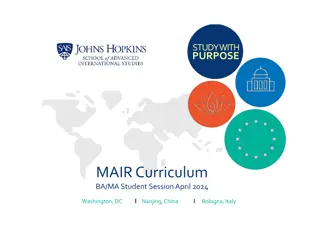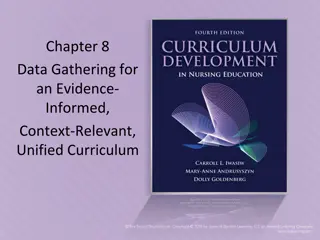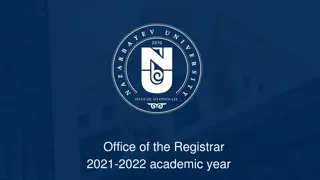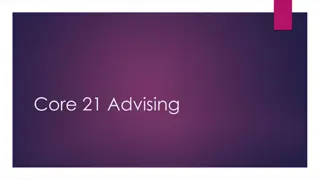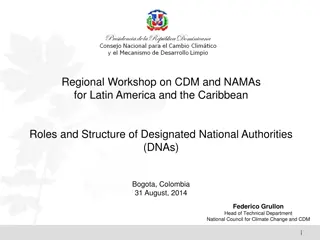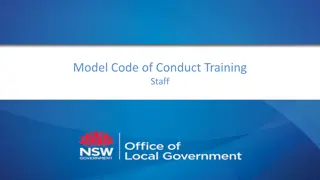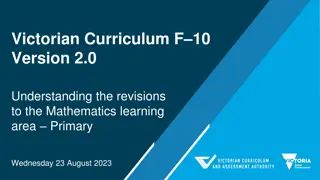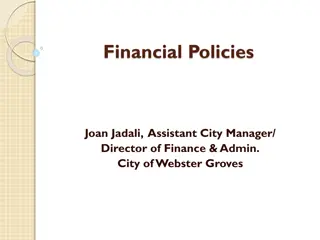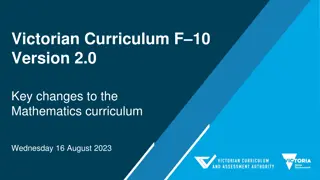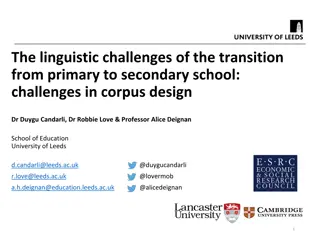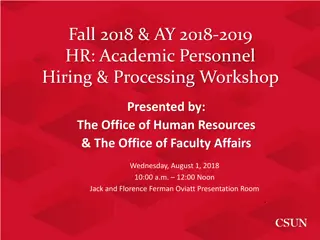Understanding CAPC: Curriculum and Academic Policies Council Overview
CAPC, the Curriculum and Academic Policies Council, is a faculty legislative body responsible for recommending changes to curriculum and academic policies. Mandated by the CBA, CAPC members participate in decision-making processes through committees and subcommittees, ultimately influencing the university's educational offerings.
Download Presentation

Please find below an Image/Link to download the presentation.
The content on the website is provided AS IS for your information and personal use only. It may not be sold, licensed, or shared on other websites without obtaining consent from the author. Download presentation by click this link. If you encounter any issues during the download, it is possible that the publisher has removed the file from their server.
E N D
Presentation Transcript
CAPC KICK-OFF MEETING Fall 2021
WHAT IS CAPC? CAPC is the Curriculum and Academic Policies Council CAPC is a faculty legislative body, the only such body with authority to recommend changes to (or creation of) the curriculum and/or academic policies CAPC is a recommending body; the Provost has sole authority other the curriculum and academic policies
WHY ARE WE HERE? because CAPC is the curricular body mandated by the CBA (Article 31 section E): There shall be a curriculum committee at each University, which shall be selected as determined by the FACULTY, but which may include at least one (1) administrator if designated by the President.
WHY ARE WE HERE? APSCUF runs elections for CAPC, which involve both at- large and department-specific members. Members are elected to do the following: participate in CAPC s decision-making processes around curriculum and academic policies report back to their constituencies (department, college, etc.) about CAPC processes and actions department-specific members also provide support and guidance for colleagues developing curriculum proposals for submission to CAPC, e.g., about learning outcomes, CIM, etc.
HOW CAPC WORKS Participation in decision-making processes happens through: work on committees and subcommittees monthly CAPC General Assembly meeting where decisions are made on the proposals sent up by the committees
HOW CAPC WORKS Several CAPC Committees have subcommittees: General Education Distributives Diverse Communities Ethics Interdisciplinary Speaking Emphasis Writing Emphasis
HOW CAPC WORKS Several CAPC Committees have subcommittees: Academic Review Course Review and Revalidation Low Enrollment Advisory New Programs Advisory Program Review Undergraduate Programs Culture Cluster
2021-22 CAPC EXECUTIVE COMMITTEE Chair Chair: Susan Johnston, Anthropology & Sociology Vice Chair Vice Chair: Josh Auld, Biology Secretary Secretary: Francis Atuahene, Undergraduate Studies & Student Support Services Undergraduate Programs Undergraduate Programs: Scott Heinerichs, Dean of the College of Health Sciences Undergraduate Policies Undergraduate Policies: Giovanni Casotti, Biology Graduate Programs & Policies Graduate Programs & Policies: Vanessa Johnson, Interim Dean of the Graduate School General Education General Education: Karen Mitchell, Psychology Academic Review Academic Review: Elizabeth Pfaffle, Applied Music CAPC Support CAPC Support: Patrick Richard, Academic Affairs
HOW CAPC WORKS You should know your assigned committee(s) by now. If not, they can be found at the CAPC website Committees should meet on a regular schedule Your service on CAPC includes attendance at both Assembly meetings Assembly meetings and committee meetings committee meetings If you cannot attend, your proxy should attend on your behalf applies to both Assembly applies to both Assembly and committee meetings meetings The bylaws require all CAPC members to have a proxy identified in advance of meetings committee
HOW CAPC WORKS Article 4.A.1.c. Each CAPC member will submit to the CAPC Secretary written notification of that member s proxy. In the case of members elected by constituency, the proxy must be selected from the same constituency. Proxies should be identified no later than the first scheduled Assembly in the fall. Should the proxy require an alternate, the proxy or member should notify the Recording Secretary in writing prior to the Assembly in which the alternate is to serve.
HOW CAPC WORKS Your service on CAPC also includes the following: preparing for committee and sub-committee meetings by reading in advance and reflecting on all documents on the agenda preparing for CAPC Assembly by reviewing in advance those items on the agenda that did not come from your committee ensuring that you are fully acquainted with the requirements for course and program proposals, including the relevant policies (syllabi, course evaluations, etc.)
HOW CAPC WORKS Part of your duty as a CAPC member is to represent your constituency, and this means reporting back about CAPC Assembly and its procedures, debates, and recommendations. This includes CAPC decisions about courses, programs, or policies that may have impact on your department (or your other constituencies), whether or not they originated in your department or college You should also let your constituents know when an item of theirs appears on the Assembly agenda and remind them that they are invited to attend the relevant assembly meeting they are invited to attend the relevant assembly meeting to respond to questions that might arise
HOW CAPC WORKS NOTE: When a committee has sent an item forward for the Assembly agenda, it is with that committee s approval (unless explicitly stated otherwise). Similarly, when a department chair, dean, or CAPC officer signs off on a proposal in CIM, it indicates approval (not simply acknowledgment) That said, deans may assume they are leaving curricular decisions to the departments and to CAPC, and are only approving the availability of resources and other non-curricular issues
HOW CAPC WORKS Motions passed by CAPC are submitted to the Provost for approval. She makes the ultimate decisions regarding curriculum and academic policy. There is a procedure for dialogue in the event that the Provost does not approve CAPC recommendations. This is rare, however. The Provost s approvals are circulated by Patrick Richard and are available on the CAPC website.
CAPC WEBSITE https://www.wcupa.edu/viceProvost/capc/
REMEMBER In summary: CAPC is a contractually mandated representative body that gives faculty significant control over the curriculum. At WCU, we have it a lot better than many other places, including some in PASSHE As CAPC representatives, we have an obligation to responsibly carry out our mandate on behalf of the faculty and departments we represent
CIM: COURSE INVENTORY MANAGEMENT https://www.wcupa.edu/viceProvost/capc/
HOW CIM WORKS Note: Email notifications (approval requests & notifications) come from Patrick Richard Note: Email notifications (approval requests & notifications) come from Patrick Richard
CIM OPEN LABS Tuesday, Sept. 7, 1:30-3:30, Philips Lower-Level Conference Room Wednesday, Sept. 15, 11:00-1:00, BPMC 115
EFFORTS THIS YEAR General Education General Education Pilot new e-portfolio platform (Google Slides) in FYE courses Plan schedule for continued review and revalidation of additional attribute courses under the new Gen Ed program over the next few years Continue faculty development (through the Gen Ed Council) to support creation of courses meeting the new or revised attributes Gen Ed courses that come through the full review process, regardless of rationale, will be reviewed under the current goal and SLO structure
EFFORTS THIS YEAR Diverse Communities Task Force Was appointed and began work last spring Continuing work this AY with anticipated report to CAPC Exec by spring Informal Caucus Process Caucus formed to assist tightly scripted programs with incorporating general education learning outcomes within curricula Rodney Mader appointed as liaison from CAPC to these programs






